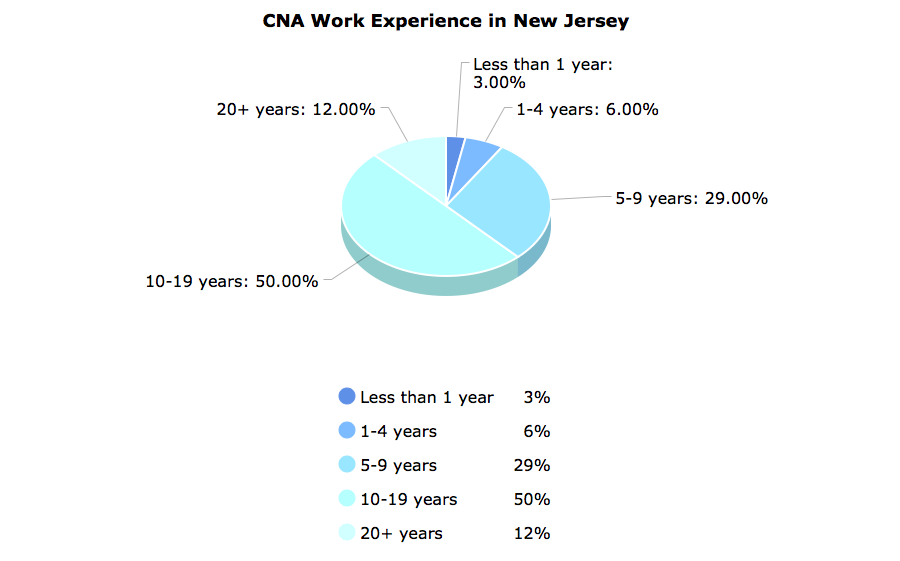Find Your CNA Classes HERE
If you are considering a CNA career for your future, there are several healthcare facilities offering CNA classes in New Jersey. Becoming a Certified Nursing Assistant is not expensive compared to college courses and it will just take few weeks to get certified. In fact, you can work right after passing the training and certification exam. All you have to do first is to find a facility offering CNA classes in NJ. These facilities will teach you the responsibilities of a CNA in order to effectively provide excellent care to patients.
The CNA training in New Jersey is rigorous and involves both mental and physical preparedness. Candidates must be trained about a plethora of medical terms and values and be constantly able to contribute to a patient’s well-being.
The precision in measurement of medications, blood sampling, and keeping track of patients’ blood pressure is of utmost importance responsibilities of nursing assistants.
Additional, Certified Nursing Assistants (CNAs) work closely with doctors and nurses, assist in daily needs of patients, such as bathing, dressing, feeding and transporting, to maintain patient’s living environment safe and clean, in controlling infection, provide emotional support and contribute in the proper operating and maintaining of medical equipment.
The New Jersey Department of Health and Human Services (NJDHSS) regulates the nursing profession in state and approves CNA training programs offered at community colleges, vocational schools, American Red Cross, online schools or distance learning courses and in other educational facilities or healthcare facilities that meet guidelines and Federal regulations.
CNA Training Requirements in New Jersey
Several training programs require the trainees to be at least 18 years old, to have a high school diploma or GED certification and clean criminal record.
According to the NJ Department of Health, a student will need to complete a Nurse Aide Training Competency Evaluation Program (NATCEP) , in order to apply for the CNA certification in New Jersey and work in any health industry as Certified Nursing Assistant (CNA).
The programs require a minimum of 90 hours of instruction, consisting of 50 hours of classroom training and 40 hours of clinical training. Classes include basic nursing topics and the study of medical terminology, infection control, nutrition, clinical practicum, personal care skills, mental health and social service needs, taking readings such as blood pressure, temperature, and pulse, how to respond to health emergencies, recording medical histories, administering medications, interpersonal skills and communicating with patients and their rights. Students will acquire nursing skills and experience in working closely with other nurses and doctors.
Regular Vs Long Term Care CNA
Once you decide to take this career path, you have to know first the type of CNA you want to be. The state of New Jersey has two types of CNA; the standard Certified Nursing Assistant and the long term care Certified Nursing Assistant. If you want to be the latter, you have to undergo more class work compared to standard CNA’s. A standard CNA class covers 75 hours classroom sessions and 100 hours clinical exposure. On the other hand, CNA’s for long term care should undergo 90 hours classroom sessions and an added 16 hours clinical exposure to the standard training. CNA classes will cover topics on basic anatomy, patient care, vital signs taking, bedside care, assisting mobile and immobile patients, physiology, and many others. Meanwhile, the clinical exposure will be handled by a Registered Nurse who has a solid work experience in the medical field. You can find all New Jersey State approved CNA classes here.
If you are wondering how to begin your CNA career, you can inquire the classes on facilities like Salem County Vocational and Technical School, Berkel Training Institute, Workforce Advantage, ASI Career Institute, Hopewell Career Institute, Medical Consultants Instructional Training Center, Camden County College, CDM Institute, Bergen Community College and Atlantic Cape Community College. Make sure that you complete the requirements set by the school in order to proceed on the training program. Take note also in passing the training program because right after it, you will have to take a certification exam by the state.
The sooner you enroll yourself to a CNA class, the faster you become certified. If you are having trouble financing your studies there are a lot of schools and healthcare facilities offering lower tuition fees or scholarships and grants. Some facilities offer free CNA training courses, in exchange the employment to that facility, after completing training and certification exam.
New Jersey CNA Certification
After completing your 90 hours of training, you need to pass the competency evaluation exam (NNAAP) administered by Pearson Vue within 24 months from education. The National Nurse Aide Assessment Program (NNAAP) is comprised of two sections. A clinical test on five randomly practical skills, which mimics a clinical setting, and a written exam which consists of 70 multiple-choice questions.
The skills evaluation comes first and examinee must pass all five practical skills in order to be able to take the written exam. Upon successful completion of the exam, the new CNA is added on the New Jersey Nurse Aide Registry which keeps a record of all the Certified Nursing Assistants (CNAs) in the state. Once certified, a new nursing assistant may find work in any healthcare facility, if of course has the appropriate experience.
As soon as you get certified, a background check and fingerprinting will be done. The Nurse Aide Registry of New Jersey does not allow a CNA to practice his/her profession once criminal offense is found. Therefore, keep your record clean and remember to complete all the requirements set by the state and the federal government.
If the student fails the competency evaluation exam three times, will need to re-take the CNA training, before being allowed to sit for the final exam again. Renewal of certification is every two years and the aide must have worked at least 8 hours in the preceding 24 months.
CNA Salary and Job Outlook in New Jersey

According to the State of New Jersey Department of Labor & Workforce Development, a CNA in New Jersey makes a median annual salary of $28,310 and the job growth is predicted to be approximately 14% for the next few years. This really is positive for all those seeking to enter the healthcare field.
As it is a promising career for the future, Certified Nursing Assistants (CNAs) in New Jersey may be able to prepare themselves for the possibility of employment in some of the largest hospitals and healthcare facilities in the state including the Atlanticare Regional Medical Center, Bergen Regional Medical Center, Hackensack University Medical Center, and Newark Beth Israel Medical Center.

- New Jersey Department of Health and Human Services (NJDHSS)
- New Jersey State Nurses Association
- Pearson Vue
- All New Jersey State Approved CNA Programs

